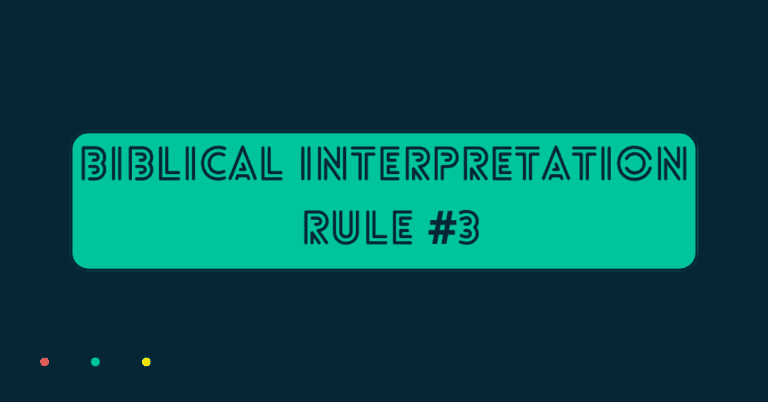A friend on Facebook recently asked me about Romans 13:1, and included the NKJV version of the text, which reads like this:
“Let every soul be subject to the governing authorities. For there is no authority except from God, and the authorities that exist are appointed by God.” (Romans 13:1 NKJV)
My friend then said, “…I’ve heard several Christians use this verse to assure others that God is in control of who is in leadership of our country. Any thoughts?”
Not surprisingly, I do have thoughts.
The immediate response in my head is a little Dwight Schrute-esque: FALSE. I do not believe that this verse communicates the simple message that “God is in control of who is in leadership in our country.” But, I’ll share more than just the Shrute shorthanded response.
First, our country didn’t exist when Paul wrote these words. I know that’s like, “duh,” but also… some folks seem to need reminding of that. Neither the US nor any of its leaders have some sort of unique and special relationship with God.. America doesn’t have a uniquely special blessing from God. The only support for the idea of America’s special blessedness are ideological threads that have very clearly mapped roots in white supremacy, manifest destiny, colonialism, and other gross garbage ideologies. So, let’s put that to bed first.
Second, the idea that we can lift this passage (or ANY passage) from the Bible…remove it from its historical, social, geopolitical, cultural, and practical context to simply apply it, with a 1-to-1 approach, to our world today is deeply flawed. So often, we forget that we have to approach the Bible on its own terms. The authors of the Bible, divinely inspired though they may have been, were individual men who had individual objectives, belief systems, personal backgrounds, social and historical contexts, and reasons for writing to the specific and finite audiences to which they wrote. Not a single one of them had the intention of writing a text that would be translated into hundreds of other languages for use in countless cultures across the globe over the next 2000+ years. Some theologians joke that Paul (who wrote Romans) would be appalled if he knew that today’s Christians had taken his writings and were trying to live by them in any sort of literal way. So, the first step in responding to your question is a reminder that though the “it all applies equally and plainly today” approach is widespread, it is also irresponsible and misguided.
If you wrote a letter to someone you loved, or to someone to whom you were a mentor, responding to their specific concerns, needs, questions, and situation… and then someone else read it 2000 years from now in a cultural context SO different from our own that it would melt your brain just to try to imagine it, I think you hesitate to have your name attached to that advice in their world. You might also not want them to read it, understand it as well as they could, and then just start applying it literally without much critical discernment to anything and everything that seemed, to them, to be an equivalent situation. Right?
As we should with any verse, we also need to look at the surrounding text. The Bible isn’t a collection of phrases to be considered one-sentence-at-a-time. This verse is a part of a larger section (12:1-15:33), the theme of which is all about being good representatives of God’s people – with one another, and within their communities and cultures.
Paul is writing to the earliest Christian communities in Rome, likely comprised of a mixture of both Jewish and Gentile Christians. The Letter to the Romans was probably written in the mid-to-late 50s AD. Emperor Claudius had expelled the Jews from Rome in the late 40s. Things were tense. However, in 54AD, Claudius died, and the ban ended. This allowed the Jews (of which Christians were seen to be a part) to return to Rome. Many scholars understand that one of Paul’s priorities was instruction for general Godly living for his audience. He’s trying to help. And a big theological theme in his writing here is loving other people. He talks a lot about how the people of God should “conduct themselves in the house churches in Rome and the larger society of the people of God.1“
Furthermore, Nero became the emperor of Rome in that same year of the Jews’ return. He had not yet fully embraced his eventual atrociously violent and unceasing persecution of Christians, but he was still the Roman Empire’s emperor… and Jesus, don’t forget, had been murdered by the will of the partnership between both the Jewish religious leadership AND the Roman political leadership, both of whom had their own reasons for wanting Jesus out of the picture.
What we have a hard time appreciating as we read the text out of its time and place is that Jesus was a RADICAL and revolutionary voice in both his political and religious contexts. He was disrupting the status quo in major ways for both groups of ruling elite. His primary messages ruffled feathers because he was overtly anti-Empire (political or religious), nonviolent, and consistently and overtly stood in support of the people in his society who’d been pushed to the margins by both the religious and political powers-that-be.
So, as a group of people who were understood to be following the teachings of this Jewish rabble rouser, the Roman house churches were a potential target for political persecution already. There had been intense tension between the Jews and Rome for many decades. Within 20 or so years of the writing of Romans, the conflict between Rome and the Jews would come to a head, culminating in the destruction of the temple in Jerusalem in 70AD, irrevocably changing Judaism forever.
So, most likely, Paul is taking the temperature of the Roman-Jewish dynamic while addressing this newly returned (but not personally known) community. He’s trying to teach these people – more and more of whom were Gentiles – how to be the people of God, especially as they now had their chance to return to Rome and show the seat of the empire what it looked like to be God’s people. He’s saying, “don’t be a problem. That’s not the way.” He’s also considering the political reality and saying, “hey, keep your heads down.”
I’ll also add that this NKJV translation isn’t necessarily the best. The NIV says that God “established” the authorities. Looking at several resources, I think that is a better translation. “Appointed” certainly implies a sort of intentional selection which isn’t really present in the original word.
Nevertheless, it is true that his words – even in the original Greek – convey some sort of idea that God is in charge of who is in power, and is the source of the authority behind those in governance. But the way some are talking about applying that idea is overly literal. It was a given in the Jewish/Christian culture of the audience that God was the source of ALL authority. No authority existed outside of God, so of course, the authority any human has on earth has its origins in God. This is maybe similar to the idea that God has delegated some (or all) of the responsibilities for care of this world to mankind. It doesn’t mean that God is choosing leaders specifically or picking one human over another to be president/emperor/whatever. It also doesn’t mean God is controlling and/or making their decisions for them. The political leaders weren’t seen as people who were representatives of God (that was the job of the Jews/Christians…as it still is!). They were just people who had power, and all power and authority ultimately comes from and belong to God.
The specific language Paul uses in both parts of this verse (“no authority except from God” and “the authorities that exist are appointed by God”) were both reformulations of a common Hebrew saying. One scholar said it this way, “The maxim is common in all Hebrew literature, but is almost always introduced to show how the Divine power is greater than that of all earthly sovereigns, or to declare the obligation of rulers as responsible for all they do to One above them2.”
I think that same lens is the right way to understand this verse relative to our politics today. As I see it, this is the challenge for Christians right now. God has a plan, yes. But WE are the plan. Christopher Wright said, “God’s church doesn’t have a mission; God’s mission has a church.” And God’s mission has always been LOVE for all. If the church wants God to be in charge, it’s us who must submit ourselves to the will of God and enact God’s Kingdom here on earth. Don’t forget Israel’s clamoring for a King to fix all their problems. God warned them that it was a terrible idea; at their insistence, God relented. The end result was division of the kingdom forever. (See 1 Samuel)
I also think there’s one other thing to consider here. Though it is often done (with shameful results), we cannot and should not read Paul without filtering Paul’s writings through the lens of Jesus. This holds for all the writings of the Bible…not just Paul…but many ideological tenets in America’s Evangelical movement happily embrace their understanding of Paul’s teachings without the guardrails of Jesus. I’ve written about that here if you’d like to understand more about that idea.
The point is this: Jesus advocated unambiguously in favor of the outcast. Jesus preached justice for the poor, the orphan, the refugee, the prisoner, the immigrant, women, and others most excluded by their society. So even if we want to hold tightly to a more literal understanding of this particular verse from Romans…we can’t do so AND ignore Jesus. Jesus was clearly anti-Empire. Jesus was non-violent. He literally died instead of fighting back or seizing power. So I simply cannot accept the idea that God would purposefully instill ANY leader that would work clearly and directly against the highest priorities established first by the text of the Bible as a whole, and reinforced very clearly by Jesus. (see Matthew 5-7)
The summary of the Bible’s teaching(“law”) is to Love God and Love One Another. Period. As I said, I don’t think this verse conveys the idea that God is “the man behind the curtain” with any earthly leader. But if I weren’t sure, the best way to get clarity would be to look at whether or not that leader’s actions looked like actions Jesus (GOD incarnate) might take. As Jesus himself said, the FRUIT of someone’s life and choices are the way to know whether or not they are false representatives of God’s Kingdom (see Matthew 7:15-20). What is that authority figure DOING with their power and their life? What are the outcomes of their choices? If it isn’t fruit that honors God’s Kingdom, as very clearly articulated in the Sermon on the Mount (Matt 5-7), it isn’t Godly. And it certainly isn’t God-initiated and God-approved.
In America right now, many who claim to live under the name of Jesus are applauding and promoting a leadership structure and model that flies in the face of the values Jesus stood and died to embody. It’s a moral crisis, and our collective failure to repent (turn and go another direction) has had and will continue to have unspeakable consequences for many of God’s beloved.
That said, our current president, like every single person in his administration, was created in the image of God. Yes, they are harming other people – seemingly without concern for the fallout. Our hearts should be breaking as we actively work to enact justice. And, as Christians, if we’re to embody the love of God, also tell the truth about the hate in our own hearts. Only with that confession can God bring us into places of redemption where we can then help bring more of redemption’s liberty to others.
- McCaulley, Esau, Amy Peeler, Janette H. Ok, and Osvaldo Padilla, eds. The New Testament in Color: Multiethnic Bible Commentary. Downers Grove, IL: IVP Academic: An Imprint of InterVarsity Press, 2024. ↩︎
- W. Sanday and Arthur C. Headlam, A Critical and Exegetical Commentary on the Epistle of the Romans, 3d ed., International Critical Commentary (New York: C. Scribner’s Sons, 1897), 366–367. ↩︎




